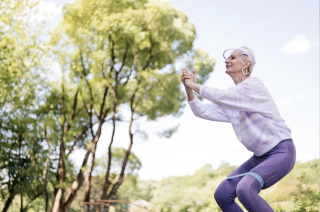Aging
Our Bodies Were Meant to Move
If you don't want to become dependent on others, exercise.
Posted May 6, 2024 Reviewed by Monica Vilhauer
Key points
- Exercise is not automatic to most of us. It takes planning.
- Building muscle in older age is about recovering from a fall without breaking a bone.
- How much would you pay for a few extra days, months, or even years of life?
“Movamiento es vida.” Movement is life. This is a movie line from World War Z — when Brad Pitt’s character is encouraging another family to escape before zombies get them. The kicker? It also applies to aging.
The CDC (Centers for Disease Control) stresses that as an older adult, regular physical activity is one of the most important things you can do for your health, helping to prevent or delay many of the health problems that seem to come with age. Want to avoid becoming dependent on others? Exercise.

They recommend a minimum of 30 minutes a day, 5 days a week of moderate-intensity activity such as brisk walking. Don’t want to move daily? Okay, then 75 minutes a week of vigorous-intensity activity such as hiking, jogging, or running should do it. Two other days a week should contain activities that strengthen muscles to improve balance, such as standing on one foot, lunging across a room, or squatting deeply when nobody’s looking.
Of course, you knew all this. It's just hard to hear while comfortably floating down that river of “denial.” It’s hard and you’ll be sore — nearly all the time. Exercise is not automatic to most of us. It takes planning. Besides, it’s simply not fair that we have to work harder to stay upright as we age. After all, these are the years we should be able to relax, right?
Perhaps what you didn’t know is that focused exercise can keep you from (1) hunching over (2) walking like a duck (3) having to sit down each time you pull up a pair of jeans, or (4) getting off the floor without grabbing onto a piece of furniture. And you are the only one who can decide if any of this matters.
You see, we don’t exercise to look svelte at our age. We do it to have the strength to recover from a fall without breaking a bone. We do it to climb steps. We do it to have the strength to hold and run with our grandchildren. And I agree — it’s not fair. I am not an “exercise” person. To do it regularly is what I refer to as a “necessary evil.” In the end, however. I know it’s a choice.
The BBC published a study a few years ago performed by the British Journal of Sports Medicine that studied how old age was affected by exercise. The real kicker? It was found to have as powerful an effect on life expectancy as giving up smoking, the researchers said. “The analysis of 5,700 elderly men in Norway showed those doing three hours of exercise a week lived around five years longer than the sedentary.”
The study conducted by Oslo University Hospital found both light and vigorous exercise played a role in extending life expectancy, while the official advice in the UK recommends 150 minutes of moderate exercise per week in the over-65s.
The trial tracking 68 to 77-year-olds found that doing less than an hour a week of light exercise had no impact; but overall those putting in the equivalent of six, 30-minute sessions of any intensity were 40% less likely to have died during the 11-year study. Even men aged 73 years had five years longer than those who remained sedentary.
How much would you pay for a few extra days, months, or even years of life? Are you convinced that 60 is the new 50? You might be right. StudyFinds.org reports that a study, conducted by a team of German and American researchers published in the journal Psychology and Aging used data analyzed from more than 14,000 people born between 1911 and 1974. And those in their mid-60s believe “old age” begins around 75. Those born after 1935 tended to push back the age at which they considered someone old. In other words, the threshold for being considered “old” has shifted upward over time.
If you’re on that same page — take heart. You’re not old yet! So get moving and push each year back a few weeks or months by getting out there and doing what needs to be done. Your family will thank you. Your body will thank you. And it might just keep you around long enough to read more “wagging finger” articles just like this one.


